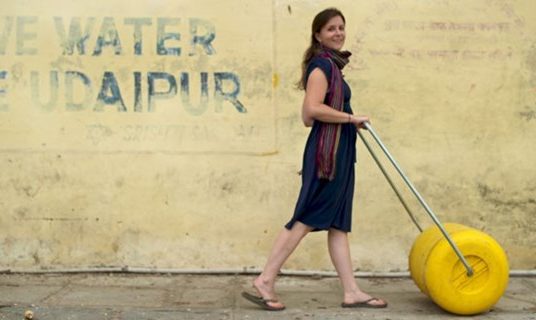
An ABC News interview with Cynthia Koenig from New York highlights the Wello Water Wheel, a 25 gallon drum used to transport water in an easy and efficient way. Most women in the developing world bear the burden of carrying water long distances from wells and other water sources back to their homes. After also learning that one in six people do not have a clean and consistent water supply, Koenig decided to create the water wheel so that women could carry more water over long distances. As a social entrepreneurs in the Unreasonable Institute in Boulder, Colorado, USA, Koenig has tested the drum in Rajasthan, India. Another pilot will enable Koenig to market the wheel to 100,000 people. Koenig, who intends to scale the project in a profitable way, also has future plans to test filtration tools, irrigation kits, and even cell phone charging through the rotation of the wheel.
When Cynthia Koenig, from New York, realized that one in six people lack reliable access to water she wanted to do something about it.
Her solution was a 25-gallon drum that can be pushed or pulled and takes away much of the burden of carrying water on the head, which is the traditional method women use in many parts of the world.
Koenig considers herself a social entrepreneur, a new breed of entrepreneur who has innovative solutions to society’s most pressing social problems and still desires to make a profit.
I caught up with her at the The Unreasonable Institute in Boulder, Colo., where 24 other social entrepreneurs were living in a house and being mentored on how to bring their ideas to scale. Here is our discussion:
Tell me about the Wello WaterWheel.
Cynthia Koenig: The WaterWheel is a 25-gallon drum that moves five times the amount of water possible than traditional methods, which is five gallons on the head. So not only is it alleviating women and girls from this tremendous physical burden of water collection, but it’s also reducing the time burden; women and girls spend about 25 percent of their time each day collecting water. So by using the water wheel it frees up their time to spend their time on more productive activities like work or school.
Where are you testing it out?
Cynthia Koenig: We spent this past summer in Rajasthan, India, doing product testing co-creating design with members of their target demographic — women and girls who live on less than $2 a day.
What’s it like right now for women in the developing world when they go about collecting their water?
Cynthia Koenig: What water collection means for women and girls is that 5 gallons of water weights 42 pounds. So if you have ever tried to lift an office water cooler into its stand you know that 42 pounds is pretty heavy. An analogy I like to use is its like getting off an airplane in La Guardia, putting your checked baggage on your head and walking to the Brooklyn Bridge and that’s something that women and girls in the developing world face every day. That’s the approximate distance, the time they’re spending and the weight that they’re carrying. There are a billion people globally that lack access to resources of safe water.
Where do you plan to bring the Wello WaterWheel?
Cynthia Koenig: Initially were focusing on the Indian market, 75 percent of Indian households don’t have piped water in the home. And we’re targeting with our pilot a market of approximately 100,000 people.
Is there anywhere else Wello would be beneficial?
Cynthia Koenig: I just got back from Haiti, where we did testing of the water wheel in rural areas; people were living on far less than the recommended amount to maintain a basic level health. This enables people to gain access to reliable sources of safe water and in Haiti with a cholera epidemic being so widespread sources of safe water are becoming more and more scarce.
What’s your vision, do you have a long-term plan for the Wello Water Wheel?
Cynthia Koenig: Wello’s mission is to deliver clean water to a thirsty world. So, initially we’re going to market with our water wheel, which is a water transportation tool, and then in the coming months and years we’ll be adding in filtration, drip irrigation kits, even a cell phone charger that uses the rotation of the wheel to charge the battery of the cell phone, so we really see it as a platform that enables people to get access to not just clean water but other really important essentials like communication and education, and even the ability to run sustainable businesses like water delivery services, so in the long-run my vision for Wello is that it helps lift families out of the cycle of poverty.
Interview has been edited.
http://abcnews.go.com/Health/GlobalHealth/reinventing-wheel/story?id=14318818
